YANGON—Myanmar rose up in defiance on Sunday, with tens of thousands of people pouring onto the streets of major cities to stage peaceful protests against the country’s latest military coup and the arrests of President U Win Myint and State Counselor Daw Aung San Suu Kyi on Monday.
The Southeast Asian country has experienced four military takeovers since its independence from the British in 1948. The previous military regime ended in 2011.
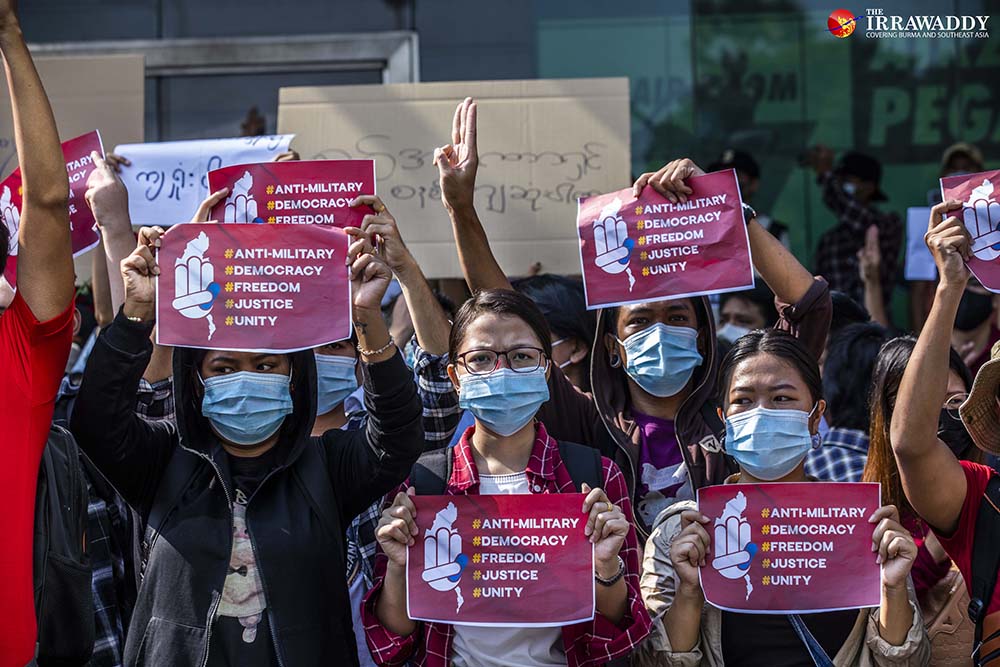
The popular protests against the recently imposed military rule began to gather steam on Saturday in the country’s business hub, Yangon, before spreading to other cities on Sunday, from Kachin’s jade town of Hpakant in the north to the capital Naypyitaw, Mandalay, Magwe, and the UNESCO World Heritage city of Bagan in central Myanmar, to Myawaddy, a border town in the country’s south. There were also marches in Pathein in the Irrawaddy Delta and the ruby town of Moegyoke.
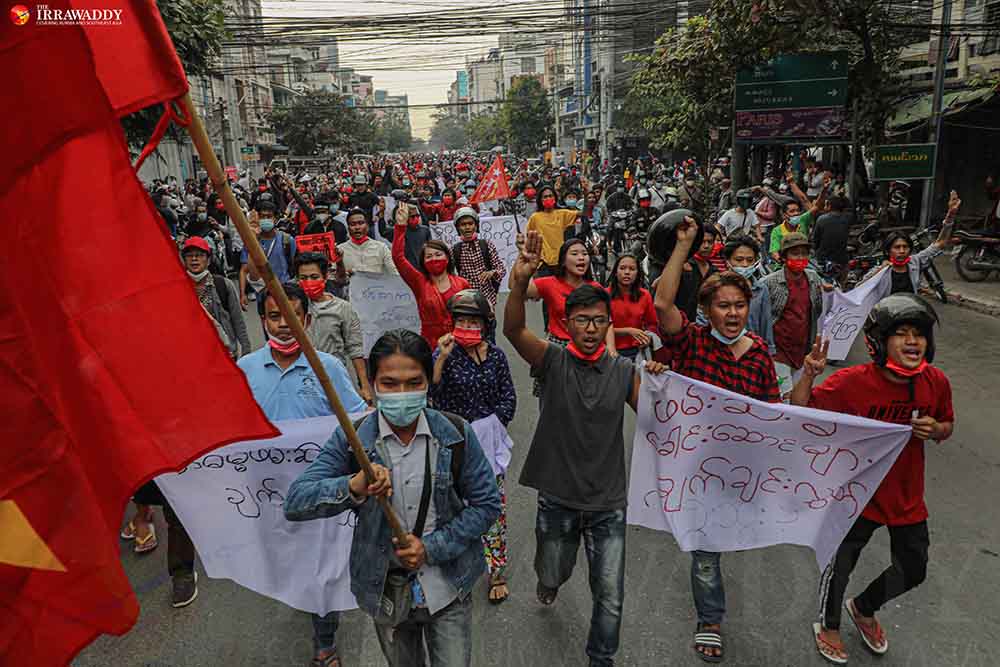
In Yangon, the epicenter of the opposition, protests in Hledan near the Yangon University campus and downtown, initially organized by workers and students, were soon joined by tens of thousands of people from every walk of life—from university students to government employees to housewives—starting on Saturday afternoon. Many held placards reading “Free Daw Aung San Suu Kyi and President U Win Myint!”; signs emblazoned with “I Voted NLD: Respect Our Votes” and “Down With Military Dictatorship!” were also common sights.
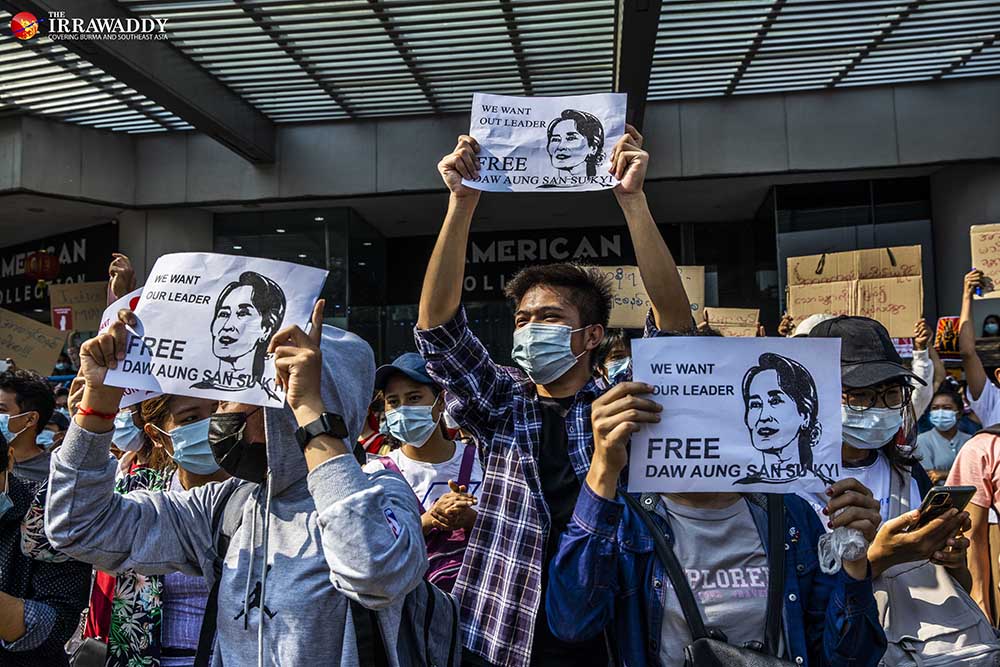
Since Saturday, the city has resounded with chanted slogans such as “Down With Military Dictatorship!” as protest columns marched down to Hledan and downtown from other parts of the city. They waved the flags of Daw Aung San Suu Kyi’s National League for Democracy (NLD) and student unions, and shouted “Good Health to Mother Suu” (referring to Daw Aung San Suu Kyi) through their facemasks—COVID-19 remains a threat in the country—while raising three fingers in a defiant salute borrowed from the “Hunger Games” films. Bystanders returned the salutes. Drivers honked their car horns to show their support for the protesters and their opposition to the coup.
Historically known for its total lack of tolerance for popular protest and its willingness to crack down on them brutally, as it did in 1988 and 2007, the military regime has been unusually unresponsive so far, though riot police have been deployed heavily near the protests.
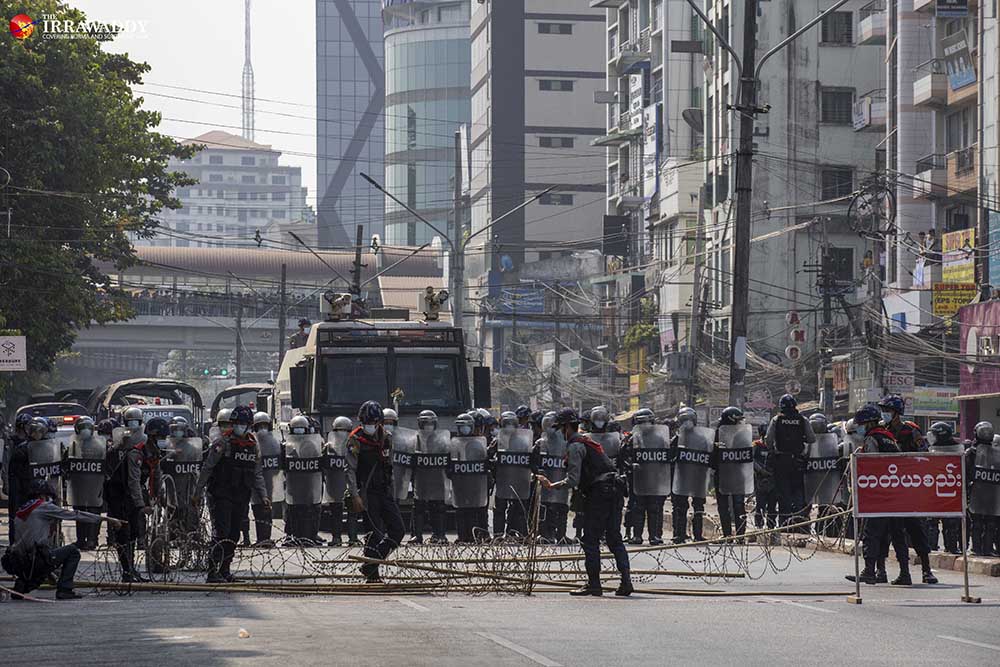
‘For our future’
Just four years old, Myanmar’s democracy came to an abrupt end on Monday when the country’s military staged a coup and arrested the nation’s elected leaders, claiming that the general election that brought a landslide victory to Daw Aung San Suu Kyi’s NLD for a second time in a row was stolen. This attempt at justification has been widely ridiculed as a lame excuse by the people; it is an open secret that the military chief, Senior General Min Aung Hlaing, eyed the country’s presidency.
The coup has enraged voters, who showed near unanimous support for the NLD at the ballot box. Many are simply refusing to accept the forced removal of a democratically elected government and view it as a direct assault on democracy. Furthermore, many worry about the severe blow the takeover will surely inflict on the country’s economy and development—both of which have already been crippled by COVID-19.
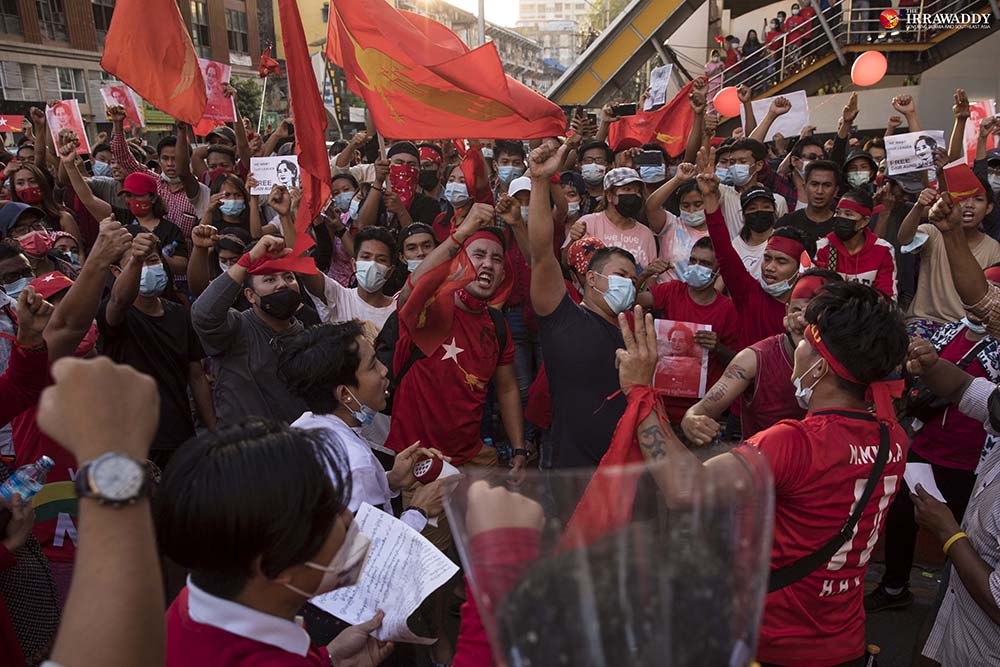
The mass popular protests emerged over the weekend, but the mood in Myanmar was unmistakably tense all last week following Monday’s coup. Starting Tuesday, at 8 p.m. every night residents have enthusiastically banged pots and pans for 30 minutes to voice their displeasure at the men in uniform. At government hospitals, doctors and nurses launched a civil disobedience movement, refusing to work until their demand for the immediate release of Daw Aung San Suu Kyi and U Win Myint is met. Inspired by their stand, staff at other government ministries soon staged their own protests to officially announce their opposition to military rule.
Wai Yan Tun is a student at the government-run Technological University in Yangon. On Saturday, the 23-year-old found himself actively joining the protest in Hledan, shouting anti-regime slogans and leading call-and-response chants via a bullhorn under the gaze of fully equipped riot police standing a few meters away.
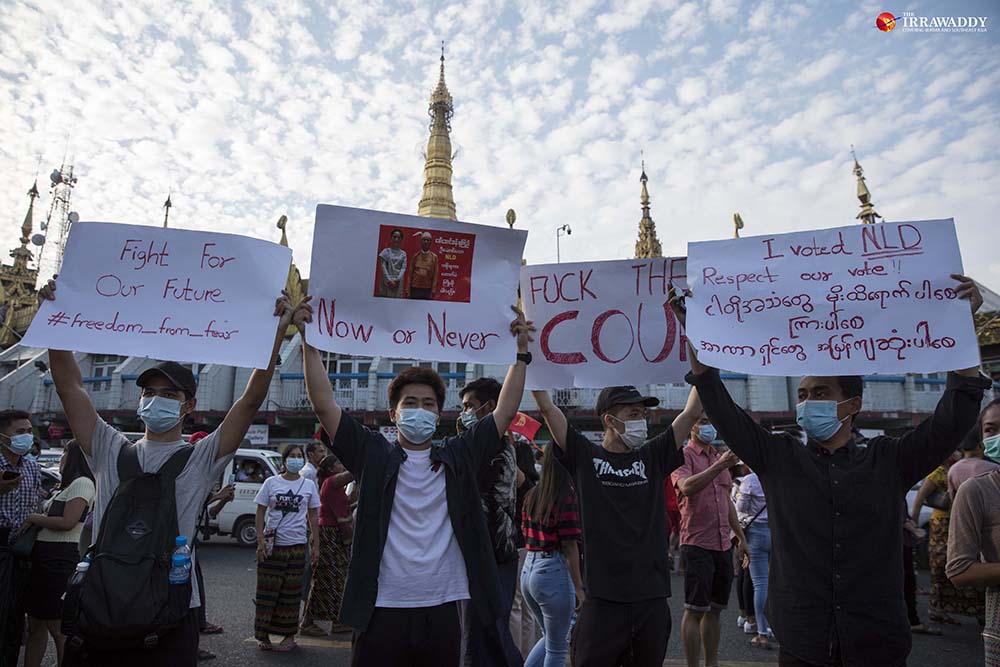
“We have to take risks; we can’t be quiet. It’s for our future and for the country’s as well,” he told The Irrawaddy while reminding his fellow protestors: “See you guys here tomorrow.”
On Sunday, the number of people joining the protests was visibly larger, doubtless due in part to anger over fake news the previous night that Daw Aung San Suu Kyi had been released—a rumor that fooled many. The main thoroughfares near Sule Pagoda were at a standstill for several minutes when a column of protesters thronged downtown’s main roads. The protesters—many of them were young people—were individually organized and visibly well mannered, in contrast to the hostile and thuggish participants who took part in pro-military rallies held a few days prior to the coup.
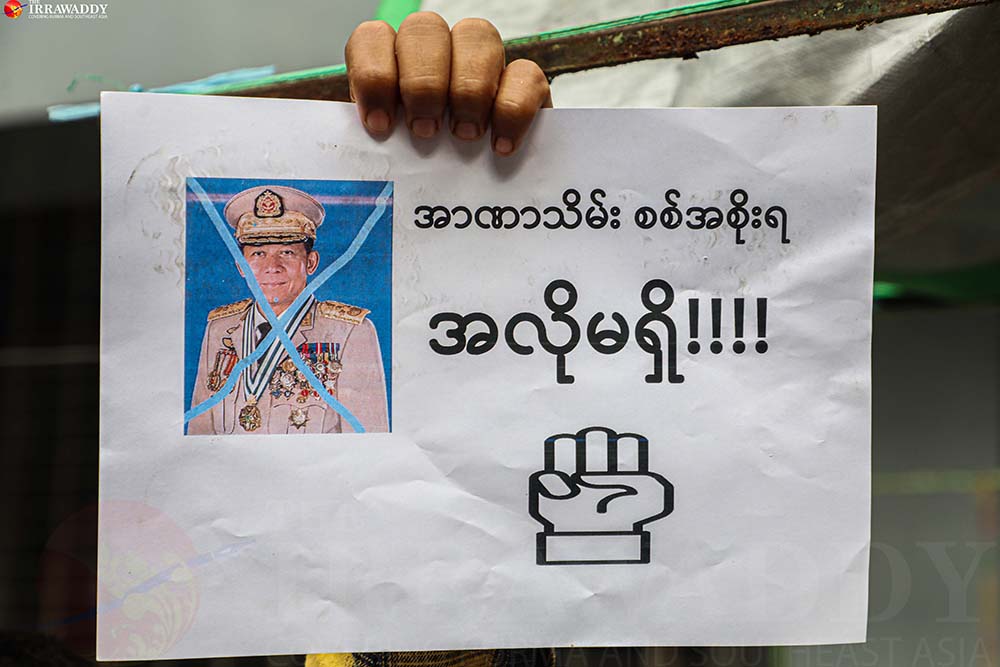
Raising three-finger salutes, they shouted “Free Mother Suu!” and “Say No to Military Rule!” Anger, despair and hope were in the air. In the shadow of Sule Pagoda they were congratulated by veteran Myanmar student leader Ko Min Ko Naing, who was among the leaders of a popular uprising in 1988 that toppled the socialist military regime of the time.
The student leader recognized that the protests this time have resulted largely from spontaneous decisions by individuals, rather than being organized by groups.
“Please be careful and unite,” he said.
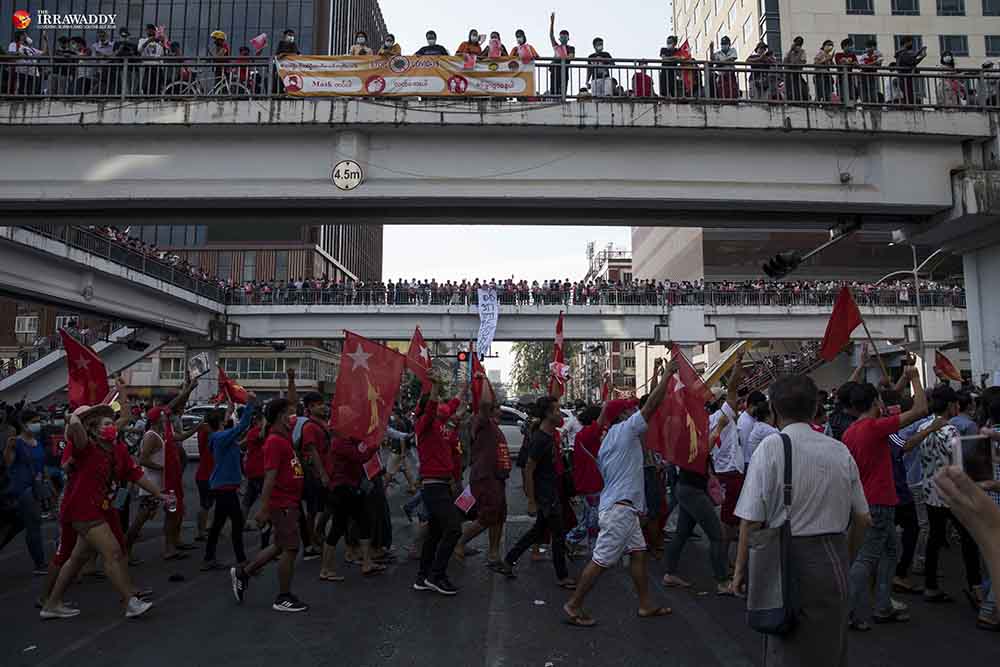
As in Hledan, security was beefed up downtown. As they faced off with police, some protesters offered them water and snacks and attempted to win over the men in riot gear, saying, “You guys are the people’s police! You are supposed to protect us!” The invitations to join forces were not taken up, however.
A middle-aged taxi driver, who relentlessly honked his horn to show his support for the protest and his opposition to the regime, said he had lived through the misery and fear created by the previous military dictatorship.
“I never want to feel that again. That’s why I am here today,” he said.
You may also like these stories:
Thousands Take to Streets of Myanmar to Protest Military Takeover
Australian Adviser to Myanmar’s Daw Aung San Suu Kyi Detained
Myanmar Copper Miners Join Anti-Coup Strike

















